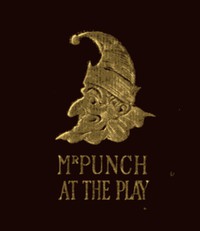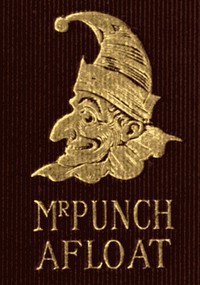Mr. Punch on the Warpath: Humours of the Army, the Navy and the Reserve Forces by - (famous ebook reader TXT) 📗

- Author: -
Book online «Mr. Punch on the Warpath: Humours of the Army, the Navy and the Reserve Forces by - (famous ebook reader TXT) 📗». Author -
3. Don't submit to harsh or cursory remarks from the adjutant. Do answer him back. You know quite well that in private life you would not put up with his hasty, ill-considered and offensive language, nor permit him to hector you because your collar was not clean, and if you have come on parade without cleaning your belt or rifle, what right has he to say that it makes him furious? Do point out to him how absurd it is to expect such[Pg 164] minute attention to discipline on the part of so intelligent a volunteer as yourself.
4. Don't overtax your strength or weaken your heart by "doubling" up impossible hills, merely because the colonel (on a horse) thinks it looks pretty. Of course you would be perfectly ready to do anything that was necessary, but how can the empire's safety depend upon your losing your wind, when the enemy are some of your oldest friends, with a handkerchief tied round their sleeves?
5. Do insist upon having hot water to shave with, and an extra blanket when the nights get chilly. Very probably the captain of your company would turn out of his bed and take your palliasse if you asked him nicely.
6. Don't do any menial or degrading work, such as cleaning cooking utensils or greasing your own boots. The Government ought to know that gentlemen can't be expected to do that kind of work, and should provide an efficient staff of servants.
7. Don't do anything you would rather not.
8. Do set all military discipline at defiance. You probably know much better than your officers.[Pg 166]
9. Don't blame me if you find yourself in prison.
10. Do make a stern resolution never to come to camp again.
11. Don't keep it.
BUTS AT BISLEY (Compiled by an evil-minded enthusiast)The shooting could not be more satisfactory but for the customary "accident."
Everyone would make a "bull" but for the haze and the shiftiness of the wind.
The catering is in every way excellent, but heavy meals scarcely assist in getting on the target.
It is delightful to entertain visitors—especially ladies—at the camp, but champagne-cup and provisions generally run into money.
It is healthy to sleep under canvas, but when the thermometer marks ninety in the shade or the rain pours down in torrents a bed in an inn is preferable.
Bisley is a beautiful place, but Woking cemetery is a dismal neighbour.
Distinctly it is nobly patriotic to spend a fortnight with the N. R. A., in the cause of the fatherland, but is it quite worth the trouble?
[Pg 163]
Swagger Yeomanry Officer. "Bring out my charger."
Job-master's Foreman. "Very sorry, sir, but e's just gorn to a funeral!"
[Pg 165]
(Scene—General Inspection of Volunteer Battalion. Lieut. Tompkins—excellent fellow, but poor soldier—called out to show the General and British public what he knows.)
General. "Now, sir, you now have the battalion in quarter column facing south. How would you get into line, in the quickest possible way, facing north-east?"
Tompkins (after much fruitless consideration). "Well, sir, do you know, that's always what I've wondered."
[Report on subaltern officers—bad.
[Pg 167]
First Miserable Sub (left at the depot). "I can't think, for the life of me, what excuse for two days' leave I'm to give the C. O. I've already weighed in with every one I can think of."
Second M. S. "Easy enough, old chap. Kill your grandmother."
First M. S. "Can't, dear boy. I'm keeping her for the Derby!"
[Pg 168]
Colonel (of the pre-examination period—to studious sub). "I say, youngster, you'll never make a soldier if you don't mind what you're about!"
Sub (mildly). "I should be sorry to think that, sir!"
Colonel. "I saw you sneaking up the High Street yesterday, looking like a Methodist parson in reduced circumstances!—Hold up your head, sir! Buy a stick, sir! Slap your leg, sir! And stare at the girls at the windows!"
[Pg 169]
"The 'orrid mess master made my kitching in, and hisself too, a-cleaning that there dratted rifle, after he'd been a booviackin' in the park!"
[Pg 170]
Auxiliary Recruit (to himself). "Murder! Murder! What'll I do now? 'Drill-sarjint tould me always to salute me officer with the far-off hand, and here's two iv 'em! Faix, I'll make it straight for meself anyhow!"
[Throws up both hands.
[Pg 171]
Sergeant O'Leary. "Double! Left! Right! What the blazes, Pat Rooney, d'ye mane by not doublin' wid the squad?"
Pat. "Shure, sergeant, 'twasn't a fair start"!
[Pg 172]
Musketry Instructor. "Now, then! How do you 'xpect to see the hobject haimed at, if you don't keep your heye closed?"
[Pg 173]
Captain of Skirmishers (rushing in to seize picket sentries of the enemy). "Hullo! He-ar! You surrender to this company!"
Opposition Lance-Corporal. "Beg pardon, sir! It's the other way, sir. We're a brigade, sir!!!"
[Pg 174]
Sentry (with mixed ideas of manual and platoon). "Gar'd t'n out!"
Commandant. "Bless you, sir, what are you about?"
Sentry. "Shure, I'm waitin' for the worr'd foire!"
[Extract from Field Exercise or Red Book, pocket edition, page 356:—Sentries paying compliments: "To field officers he will present arms."
[Pg 175]
Captain Wilkinson (excitedly, to Major Walker, of the firm of Wilkinson, Walker, & Co., Auctioneers and Estate Agents). "Don't you think we'd better bring our right wing round to attack the enemy's flank, so as to prevent their occupying those empty houses we have to let in Barker's Lane?"
[Pg 176]
Sergeant-Major. "Now, Private Smith, you know very well none but officers and non-commissioned officers are allowed to walk across this grass!"
Private Smith. "But, sergeant-major, I've Captain Graham's verbal orders to——"
Sergeant-Major. "None o' that, sir! Show me the captain's verbal orders! Show'm to me, sir!!"
[Pg 177]
Captain Barble (East Suffolkshire R. V.) going to drill, has occasion to pass a certain window for reasons best known to himself. A vague idea possesses him that something is wrong somehow, or what should create such amusement on this occasion!
[Pg 178]
MILITARY DIALOGUES IIIHOW IT SHOULD NOT BE DONE
Interior of a dreary room in the War Office. A tired-looking young officer, in mufti, sits at a table with great piles of papers, each bundle tied with red tape and ticketed with labels of different colours, on one side of it ready to his hand. Another pile of papers, which he has already dealt with, is on the other side of the table. He is an official and has many letters, the first two being D. A. after his name. The gas has just been lighted. A clerk brings in another fat bundle of papers.
The Officer (patting the smaller pile on the table). These can go on, Smithers. That question of sardine-openers must go back to the commissariat, and the General commanding the Central District must be authorised to deal on his own responsibility with the matter of the fierce bull in the[Pg 180] field where the recruits bathe. What have you got there?
The Clerk. It is the correspondence, sir, relative to that false tooth requisitioned for by the officer commanding the Rutlandshire Regiment for the first cornet of the band. The Medical Department sent it back to us this morning, and there is another letter in from the Colonel, protesting against his regiment being forced to go route marching to an imperfect musical accompaniment.
The Officer (groaning). I thought we had got rid of that matter at last by sending it to the doctors.
The Clerk. No, sir. The Surgeon-General has decided that "one tooth, false, with gold attachment," cannot be considered a medical comfort.
The Officer (taking a pr�cis from the top of the papers). I suppose we must go into the matter again. It began with the letter from the Colonel to the General?
The Clerk. Yes, sir, here it is. The O. C. the Rutland Regiment has the honour to report that the first cornet player in the band has lost a[Pg 182] tooth, and as the band has become inefficient in the playing of marching music in consequence, he requests that a false tooth may be supplied at Government expense.
The Officer. And the General, of course, replied in the usual formula that he had no fund available for such purpose.
The Clerk. Yes, sir; but suggested that the regimental band fund might be drawn on.
The Officer. Where is the Colonel's letter in reply. (It is handed to him.) Ah, yes. Band fund is established, he writes, for purchase of musical instruments and music, and not for repair of incomplete bandsmen, and refuses to authorise expense, except under order from the Commander-in-Chief.
The Clerk. The General sends this on to us with a remark as to the Colonel's temper.
The Officer. And we pass it to the Quarter-Master-General's people, suggesting that under certain circumstances a false tooth might be considered a "necessary," and a free issue made.
The Clerk. A very long memo, on the subject, in reply, from the Q.-M.-G., sir. He points out[Pg 184] that though, under exceptional circumstances, a pair of spectacles might be held to be a sight-protector, a false tooth could not be held to be either a fork, a spoon, a shaving-brush, a razor, or even an oil bottle.
The Officer. We wrote back suggesting that it might pass as a "jag"—our little joke.
The Clerk. Your little joke, sir. The Q.-M.-G.'s people didn't see it.
The Officer. No? Then the correspondence goes on to the Ordnance Department, with a suggestion that a false tooth might be considered an arm or an accoutrement.
The Clerk. The Director-General replies, sir, that in the early days of the British Army, when the Army Clothing Department's sole issue was a supply of woad, a tooth, or indeed a nail, might have reasonably been indented for as a weapon, but that, owing to the introduction and perfection of fire-arms, such weapons are now obsolete and cannot be issued.
The Officer. And now the Medical Service refuse to help us.
The Clerk. Yes, sir. They cannot bring the[Pg 186] fixing of it under the head of surgical operations, and the Surgeon-General points out very justly, if I may be permitted to say so, sir, that a seal-pattern false tooth could hardly be considered a "medical comfort."
The Officer. What are we to do? The Colonel of the regiment is evidently furious.
The Clerk. We might send the correspondence to the Inspector of Iron Structures. He may be able to do or suggest something.
The Officer. Very well; and will you send off this telegram to my wife saying I have a long evening's work before me, and that I shall not be able to get back to dinner to-night? (Exit the Clerk.) Whenever will they trust a General Commanding a District to spend for the public good on his own responsibility a sum as large as a schoolboy's allowance, and so take some of the unnecessary work off our shoulders?
[He tackles wearily another file of papers.
[Pg 179]
"So glad to see you, Mrs. Bamsby! And how is your dear husband? Where is the Colonel? I was only saying the other day, 'I wonder when I shall see Colonel Bamsby!'"
Mrs. Colonel B. "You'll see him now, my dear if I just step aside, or you walk round me."
[Pg 181]
Adjutant. "Your orders are that when you are attacked, Captain Slasher, you are to fall back slowly."
Capt. Slasher. "In which direction am I to retire, sir?"
Adjutant. "Well, the proper way, of course,





Comments (0)